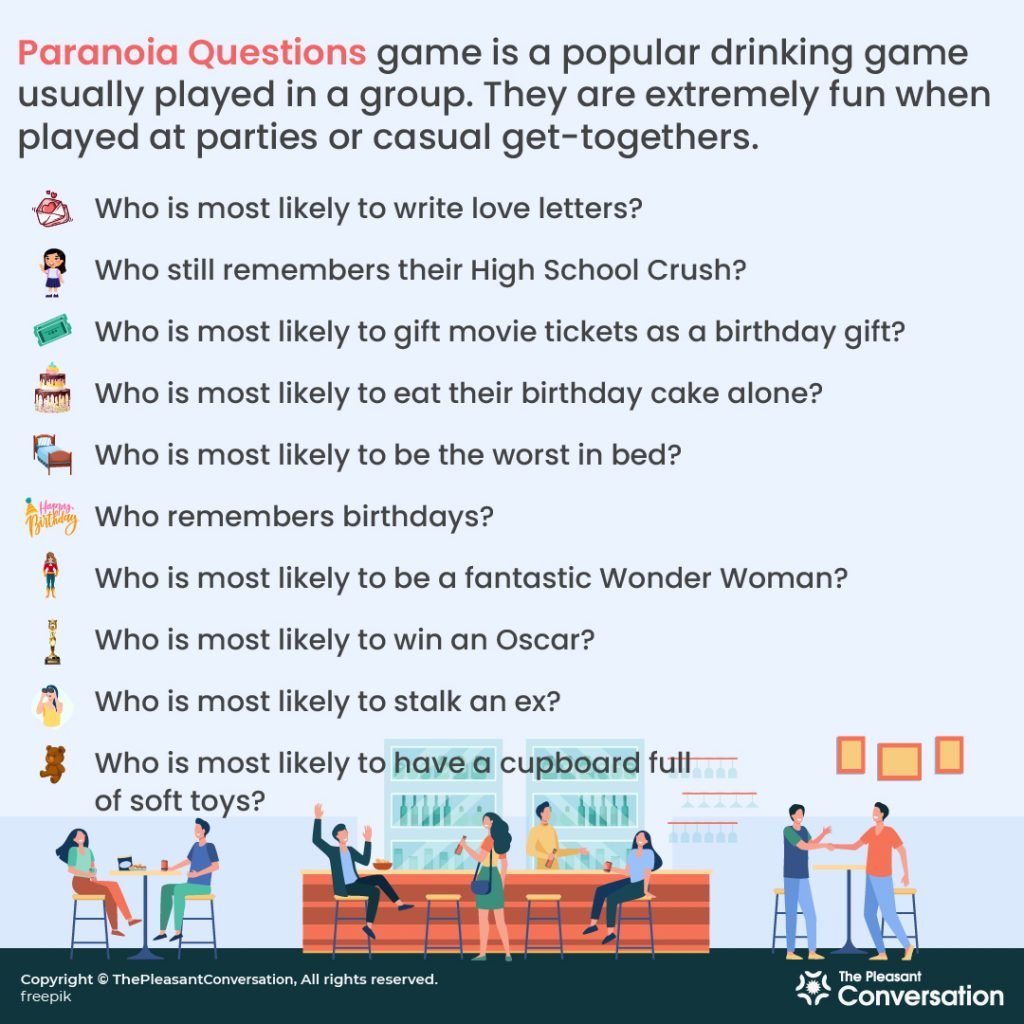Fun Paranoia Questions: Spark Laughter & Suspense
Ever wondered what your friends really think about you? Paranoia, the whisper-in-the-ear question game, offers a thrilling blend of suspense, laughter, and revelation, turning any gathering into a playful exploration of hidden thoughts and playful suspicions. But with the power to spark both amusement and unease, the key lies in crafting the perfect questions. From lighthearted teases to daring inquiries, the art of crafting the right paranoia question can elevate a simple game into an unforgettable experience.
Navigating the nuances of paranoia requires a delicate balance. It's a game built on implication and assumption, where a single question can ignite a chain reaction of speculation. "Who here is most likely to start a food fight?" might elicit chuckles and playful accusations. But "Who here harbors a secret crush on someone in this room?" raises the stakes considerably, adding a frisson of anticipation and perhaps a touch of genuine anxiety. The true magic lies in the unspoken, the unanswered, the delicious tension that hangs in the air after each whispered query. It's a game that dances on the edge of discomfort, testing the boundaries of friendships and revealing the undercurrents of group dynamics. The key is to keep it fun, encouraging lighthearted speculation rather than genuine suspicion. With a careful selection of questions and a playful atmosphere, paranoia can be a memorable way to connect with friends and family on a deeper, albeit slightly mischievous, level. So, gather your friends, prepare for some red faces and nervous laughter, and dive into the intriguing world of paranoia.
| Game Title | Paranoia |
| Type | Party Game, Social Game, Question Game |
| Players | 3+ |
| Materials | None (optional: List of pre-written questions) |
| Objective | To generate fun, laughter, and intrigue through whispered questions and speculation. |
| How to Play | Players sit in a circle. One player whispers a question about the group to the person on their right. The recipient answers by pointing to someone in the circle (or themselves). The question asker does not reveal the question to the group. Play continues with the next player whispering a new question. |
| Variations | "Most Likely To," "Never Have I Ever" (adapted for whispered format), themed question lists (e.g., school, work, travel). |
| Reference | Wikipedia - Paranoia (game) |
The beauty of paranoia lies in its simplicity. No elaborate boards, no complex rules, just a circle of friends and a healthy dose of curiosity. The game thrives on whispered secrets and unspoken accusations. It's a game that can be enjoyed anywhere, anytime, with minimal preparation. All you need is a group of willing participants and a spark of mischief.
But the simplicity of the game doesn't mean the questions should be an afterthought. Crafting the right questions is the key to unlocking the full potential of paranoia. Think about your audience: close friends will likely appreciate more personal and pointed questions, while new acquaintances might benefit from more general or humorous prompts. "Who here is most likely to win a Nobel Prize?" could be a fun icebreaker, while "Who here is most likely to have a secret tattoo?" might be better suited for a close-knit group. The spectrum of questions is vast, from the silly to the serious, from the revealing to the ridiculous. It's a game that allows for creativity and personalization, giving players the freedom to tailor the experience to their specific group dynamic.
Paranoia is more than just a game; it's a social experiment. It's a chance to observe how individuals react to veiled accusations and unspoken suspicions. It's a study in body language, a test of friendships, and a window into the hidden thoughts and perceptions that shape our social interactions. Some might revel in the playful tension, while others might squirm under the weight of unspoken accusations. The game can expose hidden anxieties, reveal surprising alliances, and even spark unexpected conversations.
While the core of paranoia revolves around anonymity and speculation, variations exist. Some groups opt for a "Most Likely To" format, where the question asker reveals the question after everyone has pointed. Others adapt "Never Have I Ever," whispering their secrets instead of announcing them aloud. Themed question lists can add another layer of fun, focusing on specific topics like school, work, or travel. "Who in this class is most likely to become a millionaire?" or "Who here has had the most awkward travel experience?" can tailor the game to a particular context and elicit even more targeted responses.
One of the unspoken rules of paranoia is the implicit understanding that it's all in good fun. The game should never be used to intentionally hurt or offend anyone. Questions should be carefully considered to avoid crossing personal boundaries or triggering sensitive topics. While a little playful teasing is part of the fun, genuine accusations or malicious gossip should be avoided. The goal is to create laughter and intrigue, not to sow discord or damage relationships. It's a game that requires trust and mutual respect, ensuring that the paranoia remains playful and doesn't escalate into genuine discomfort or anxiety.
Paranoia, at its heart, is a game about connection. It's a way to engage with friends and family on a deeper, more playful level. It's a chance to test the waters of social dynamics, to explore the unspoken assumptions and hidden perceptions that shape our relationships. With the right questions and a lighthearted approach, paranoia can transform an ordinary gathering into an unforgettable evening of laughter, speculation, and shared moments of playful anxiety. So, gather your friends, craft your questions, and prepare to dive into the delightfully unsettling world of paranoia.
Don't forget the cardinal rule: never reveal the question! The power of paranoia lies in the unspoken, the implied, the delicious uncertainty that hangs in the air. It's this element of mystery that makes the game so captivating, so addictive, and so much fun.



Detail Author:
- Name : Rubie Ward
- Email : doreilly@gmail.com
- Birthdate : 2004-05-12
- Address : 73148 Sipes Expressway North Nelleport, IA 01131-2480
- Phone : +1-805-268-7974
- Company : Armstrong-Rempel
- Job : Mathematician
- Bio : Odit non laudantium accusantium suscipit. Modi ullam rerum pariatur ea eos. Quas praesentium quas reprehenderit enim animi maiores ad modi.